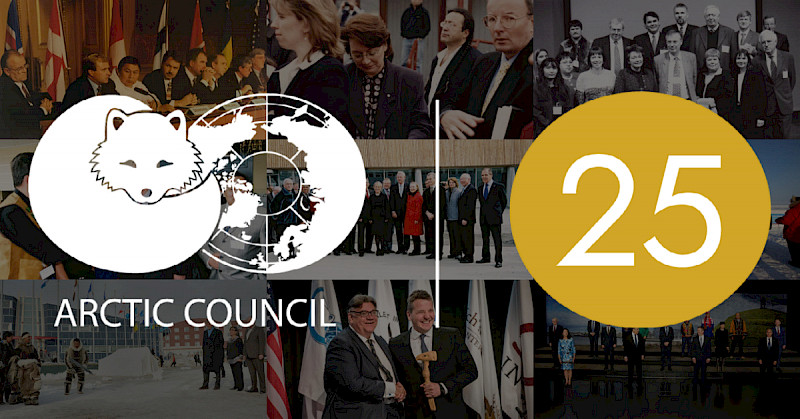Source: Arctic Council
The world’s leading international forum for Arctic cooperation reflects on the unique collaboration among Arctic States and Arctic Indigenous Peoples, and looks forward to a long-term future of peace, stability and prosperity in the region
 On 19 September 1996, the eight Arctic States signed the Ottawa Declaration, establishing the Arctic Council to enhance cooperation, coordination and interaction among the Arctic States, Arctic Indigenous Peoples and other Arctic inhabitants. When the Council was established 25 years ago, it was one of the first major arenas for cooperation between the Arctic States following the Cold War. Today, the Council has grown into an influential forum that has created trustful relationships between the Arctic States and Indigenous Peoples. The Council produces ground-breaking reports, contributes to international conventions and legally binding agreements, and coordinates joint action on the most vital issues in the region.
On 19 September 1996, the eight Arctic States signed the Ottawa Declaration, establishing the Arctic Council to enhance cooperation, coordination and interaction among the Arctic States, Arctic Indigenous Peoples and other Arctic inhabitants. When the Council was established 25 years ago, it was one of the first major arenas for cooperation between the Arctic States following the Cold War. Today, the Council has grown into an influential forum that has created trustful relationships between the Arctic States and Indigenous Peoples. The Council produces ground-breaking reports, contributes to international conventions and legally binding agreements, and coordinates joint action on the most vital issues in the region.
The Arctic Council’s work has always centered around improving the well-being of Arctic inhabitants, protecting the Arctic environment and promoting sustainable development throughout the region. As climate change continues to rapidly impact the Arctic, warming three times faster than any other place in the world, the Council’s work is evermore important to promote a positive agenda and coordinate joint action to secure a prosperous future for all inhabitants.
“Today, the Arctic represents a unique, but fragile ecosystem, people who live and work there, and a huge potential for common development,” said Sergey Lavrov, Foreign Minister of the Russian Federation and Chair of the Arctic Council. “It is good to see that, despite the complexities in global affairs, interstate relations in high latitudes continue to develop in a constructive manner. I am delighted to note that this engagement is largely possible due to the work of the Arctic Council. A quarter of a century of persistent, meticulous work on building a system of interaction really pays off.”
Although the Arctic Council has grown and adapted significantly, one unique element that has remained from the start is the role of Arctic Indigenous Peoples, who have Permanent Participant status. The Arctic Council is the first and only forum where Indigenous Peoples sit at the same table as States, and they have full consultation rights in connection with the Council’s negotiations and decisions. Much of the success of the Arctic Council can be attributed to the active participation of the Permanent Participants, who have extensive knowledge and experience on the ground in the Arctic.
“The Arctic Council is an exceptional body where eight States and six Indigenous Permanent Participants are working and cooperating together peacefully,” said Hjalmar Dahl, President of Inuit Circumpolar Council Greenland and Chair of the Indigenous Peoples Secretariat. “The Permanent Participants have developed Indigenous knowledge principles to strengthen the Arctic Council and advance its objectives. Indigenous Knowledge has been formally recognized by the Arctic Council as important to understanding the Arctic in numerous Ministerial Declarations, including the 1996 Ottawa Declaration on the establishment of the Arctic Council. The role of Arctic Indigenous Peoples and their Indigenous knowledge is invaluable not only for future development of Arctic societies but also in the conservation and sustainable use of biological resources.”
"The role of Arctic Indigenous Peoples and their Indigenous knowledge is invaluable not only for future development of Arctic societies but also in the conservation and sustainable use of biological resources.”Hjalmar Dahl, President of Inuit Circumpolar Council Greenland and Chair of the Indigenous Peoples Secretariat.
Over 25 years, as interest and pressure in the Arctic region grew, Arctic cooperation through the Arctic Council strengthened. Three legally binding agreements were negotiated under the auspices of the Arctic Council, the 2011 “Agreement on Cooperation on Aeronautical and Maritime Search and Rescue in the Arctic,” the 2013 “Agreement on Cooperation on Marine Oil Pollution Preparedness and Response in the Arctic” and the 2017 “Agreement on Enhancing International Arctic Scientific Cooperation.”
The Council has played a leading role in delivering influential reports and assessments through its six Working Groups and extensive network of experts, such as the 2004 Arctic Climate Impact Assessment, which brought Arctic issues to the global agenda, the Arctic Marine Strategic Plan that advanced the Council’s marine stewardship, the Arctic Biodiversity Assessment, which was the first circumpolar inventory of status and trends for biodiversity in the Arctic, and the 2020 Briefing on Covid-19 in the Arctic, which provided timely insight into the complex and intricate ways the pandemic impacts Arctic communities, creating an impetus for future work on the emerging issue. The Council’s work has also contributed to international treaties and conventions, including the Stockholm Convention on Persistent Organic Pollutants, the Minamata Convention on Mercury, the International Maritime Organization’s Polar Code and others.
In recognizing its responsibility and leadership role the Arctic, and that many challenges facing the Arctic are global in nature, the Council has accredited 38 Observers that constructively contribute to its work. The Arctic Council has also facilitated the creation of additional structures for regional cooperation including the University of the Arctic, the Arctic Economic Council, the Arctic Coast Guard Forum, the Sustaining Arctic Observing Networks forum, among others.
"The Arctic Council today is much stronger than it was in the beginning."Mary Simon, Governor General of Canada and former lead negotiator of the Ottawa Declaration
The Arctic Council did not become the success it is considered today overnight. Twenty-five years of dedicated work, over 10 declarations and numerous cooperation mechanisms along the way have significantly strengthened the Council. “There were a lot of issues out there that had to be dealt with,” said Mary Simon, Governor General of Canada and former lead negotiator of the Ottawa Declaration, in a recent interview on occasion of the Council’s anniversary. “I’ve always felt that you can build on what you agree on, and the Arctic Council today is much stronger than it was in the beginning.”
In recognition of its 25th anniversary, the Arctic Council adopted its first Strategic Plan that reflects the shared values and joint aspirations of the Arctic States and Permanent Participants and will guide the Council’s work over the next decade. This 25th anniversary, the Arctic States and Permanent Participants reaffirm their commitment to maintain the Arctic as a region of peace, stability and constructive cooperation, and strive to ensure a prosperous, sustainable and secure home for all Arctic inhabitants.


